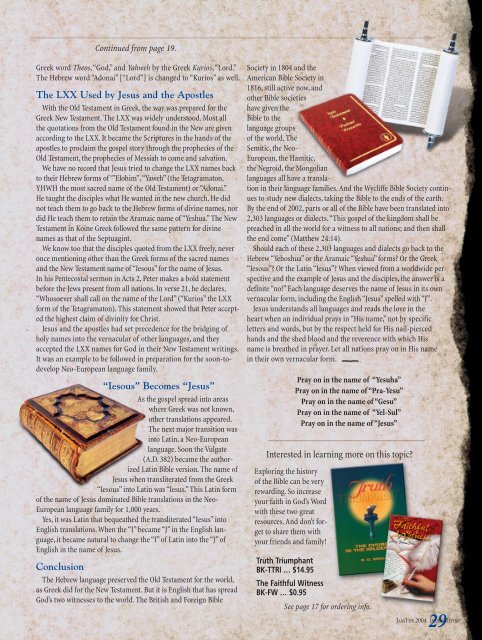By Anthony Lester - Amazing Facts
By Anthony Lester - Amazing Facts
By Anthony Lester - Amazing Facts
Create successful ePaper yourself
Turn your PDF publications into a flip-book with our unique Google optimized e-Paper software.
Continued from page 19.<br />
Greek word Theos,“God,”and Yahweh by the Greek Kurios,“Lord.”<br />
The Hebrew word “Adonai” [“Lord”] is changed to “Kurios” as well.<br />
The LXX Used by Jesus and the Apostles<br />
With the Old Testament in Greek, the way was prepared for the<br />
Greek New Testament. The LXX was widely understood. Most all<br />
the quotations from the Old Testament found in the New are given<br />
according to the LXX. It became the Scriptures in the hands of the<br />
apostles to proclaim the gospel story through the prophecies of the<br />
Old Testament, the prophecies of Messiah to come and salvation.<br />
We have no record that Jesus tried to change the LXX names back<br />
to their Hebrew forms of ‘”Elohim”,“Yaweh” (the Tetagramaton,<br />
YHWH the most sacred name of the Old Testament) or “Adonai.”<br />
He taught the disciples what He wanted in the new church. He did<br />
not teach them to go back to the Hebrew forms of divine names, nor<br />
did He teach them to retain the Aramaic name of “Yeshua.” The New<br />
Testament in Koine Greek followed the same pattern for divine<br />
names as that of the Septuagint.<br />
We know too that the disciples quoted from the LXX freely, never<br />
once mentioning other than the Greek forms of the sacred names<br />
and the New Testament name of “Iesous” for the name of Jesus.<br />
In his Pentecostal sermon in Acts 2, Peter makes a bold statement<br />
before the Jews present from all nations. In verse 21, he declares,<br />
“Whosoever shall call on the name of the Lord” (“Kurios” the LXX<br />
form of the Tetagramaton). This statement showed that Peter accepted<br />
the highest claim of divinity for Christ.<br />
Jesus and the apostles had set precedence for the bridging of<br />
holy names into the vernacular of other languages, and they<br />
accepted the LXX names for God in their New Testament writings.<br />
It was an example to be followed in preparation for the soon-todevelop<br />
Neo-European language family.<br />
“Iesous” Becomes “Jesus”<br />
As the gospel spread into areas<br />
where Greek was not known,<br />
other translations appeared.<br />
The next major transition was<br />
into Latin, a Neo-European<br />
language. Soon the Vulgate<br />
(A.D. 382) became the authorized<br />
Latin Bible version. The name of<br />
Jesus when transliterated from the Greek<br />
“Iesous” into Latin was “Iesus.” This Latin form<br />
of the name of Jesus dominated Bible translations in the Neo-<br />
European language family for 1,000 years.<br />
Yes, it was Latin that bequeathed the transliterated “Iesus” into<br />
English translations. When the “I” became “J” in the English language,<br />
it became natural to change the “I” of Latin into the “J” of<br />
English in the name of Jesus.<br />
Conclusion<br />
The Hebrew language preserved the Old Testament for the world,<br />
as Greek did for the New Testament. But it is English that has spread<br />
God’s two witnesses to the world. The British and Foreign Bible<br />
Society in 1804 and the<br />
American Bible Society in<br />
1816, still active now, and<br />
other Bible societies<br />
have given the<br />
Bible to the<br />
language groups<br />
of the world. The<br />
Semitic, the Neo-<br />
European, the Hamitic,<br />
the Negroid, the Mongolian<br />
languages all have a translation<br />
in their language families. And the Wycliffe Bible Society continues<br />
to study new dialects, taking the Bible to the ends of the earth.<br />
<strong>By</strong> the end of 2002, parts or all of the Bible have been translated into<br />
2,303 languages or dialects.“This gospel of the kingdom shall be<br />
preached in all the world for a witness to all nations; and then shall<br />
the end come” (Matthew 24:14).<br />
Should each of these 2,303 languages and dialects go back to the<br />
Hebrew “Yehoshua” or the Aramaic “Yeshua” forms? Or the Greek<br />
“Iesous”? Or the Latin “Iesus”? When viewed from a worldwide perspective<br />
and the example of Jesus and the disciples, the answer is a<br />
definite “no!” Each language deserves the name of Jesus in its own<br />
vernacular form, including the English “Jesus” spelled with “J”.<br />
Jesus understands all languages and reads the love in the<br />
heart when an individual prays in “His name,” not by specific<br />
letters and words, but by the respect held for His nail-pierced<br />
hands and the shed blood and the reverence with which His<br />
name is breathed in prayer. Let all nations pray on in His name<br />
in their own vernacular form.<br />
Pray on in the name of “Yesuha”<br />
Pray on in the name of “Pra-Yesu”<br />
Pray on in the name of “Gesu”<br />
Pray on in the name of “Yel-Sul”<br />
Pray on in the name of “Jesus”<br />
Interested in learning more on this topic?<br />
Exploring the history<br />
of the Bible can be very<br />
rewarding. So increase<br />
your faith in God’s Word<br />
with these two great<br />
resources. And don’t forget<br />
to share them with<br />
your friends and family!<br />
Truth Triumphant<br />
BK-TTRI … $14.95<br />
The Faithful Witness<br />
BK-FW … $0.95<br />
See page 17 for ordering info.<br />
JAN/FEB 2004 INSIDE REPORT 29


